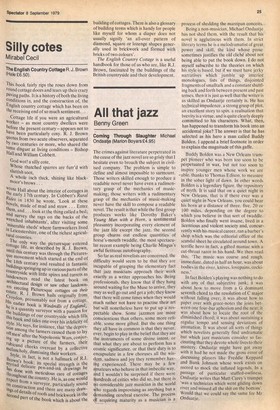All that jazz
Benny Green
Coming Through Slaughter Michael Ondaatje (Marion Boyars E4.95) The crimes against literature perpetrated in the cause of the jazz novel are so grisly that I hesitate even to broach the subject in civilised company. The problem is simple to define and almost impossible to surmount. Those writers skilled enough to produce a readable novel never have even a rudimentary grasp of the mechanics of musicmaking; those writers with a rudimentary grasp of the mechanics of music-making never have the skill to compose a readable novel. The result is that while the first group produces works like Dorothy Baker's Young Man with a Horn, a sentimental pleasantry incorporating every element of the jazz life except the jazz, the second group churns out endless quantities of horse's-mouth twaddle. the most spectacular recent example being Charlie Mingus's awful fictitious autobiography.
So far as real novelists are concerned, the difficulty would seem to be that they are incapable of grasping the elementary fact that jazz musicians approach their work exactly as a writer approaches his. Being professionals. they know that if they hang around waiting for the Muse to arrive, they may as well go out and get a job; they know that there will come times when they would much rather not have to practise their art but will nonetheless have to put up a respectable show. Some jazzmen are more conscientious than others, some more reliable, some more gifted. But the one thing they all have in common is that they never. ever, begin to play in the belief that they are the instruments of some divine intent, or that what they are about to perform has a cosmic significance. or that their duty is to encapsulate in a few choruses all the wisdom. sadness and joy they remember having experienced. There may be a few amateurs who behave in that imbecilic way. and I wouldn't be surprised if there were hundreds of critics who did so, but there is no considerable jazz musician in the world Who regards improvising as anything but a demanding cerebral exercise. The process if acquiring maturity as a musician is a process of shedding the marzipan conceits.
Being a non-musician. Michael Ondaatje has not shed them, with the result that his novel is agglutinous with them. In strict literary terms he is a melodramatist of great power and skill, the kind whose prose sometimes justifies the old cliché about not being able to put the book down. I do not myself subscribe to the theories on which his style is based, but if we must have jerky narratives which jumble up interior monologues, lists of things, disjointed fragments of smalltalk and a constant shuttling back and forth between present and past tenses, then it is just as well that the writer is as skilled as Ondaatje certainly is, He has technical impudence, a strong grasp of plot. an excellent story to spin, a realisation that brevity is a virtue, and is quite clearly deeply committed to his characters. What, then, has happened to transform his book into an accidental joke? The answer is that he has selected as his hero a man called Buddy Bolden. I append a brief footnote in order to explain the magnitude of this gaffe.
Buddy Bolden was a New Orleans trumpet pioneer who was born too soon to be perpetuated in wax, but not too soon to inspire younger men whose work we are ...able, thanks to Thomas Edison, to measure in the sober light of dawn. In other words Bolden is a legendary figure. the repository of myth. It is said that on a quiet night in New Orleans, that is if there ever was a quiet night in New Orleans, you could hear his horn at a distance of three, five. 20 or 100 miles, depending on the degree to which you believe in that sort of twaddle. Bolden who finally went insane, lived in a licentious and violent society and, concurrently with his musical career, ran a barber's shop which was the editorial office of the scandal sheet he circulated around town. A terrific hero in fact. a gifted maniac with a cut-throat razor in his hand. We then read this: 'The music was coarse and rough. immediate, dated in half an hour. was about bodies in the river, knives. lovepains, cockiness.'
In fact Bolden's playing was nothing to do with any of that subjective junk; it was about how to move from a G dominant seventh chord to the resolution of C major without falling over; it was about how to paper over with grace-notes the joins between one four-bar aphorism and the next; it was about how to locate the root of the diminished chord; it was about sustaining a regular tempo and sensing deviations of intonation:It was about all sorts of things which novelists generally find undramatic but which jazz musicians consider so fascinating that they devote whole lives to their mastery. Ondaatje might have got away with it had he not made the gross error of discussing players like Freddie Keppard and Bunk Johnson whose work exists on record to mock the inflated legends. In a passage of particular stuffed-owliness, Ondaatje writes that Mutt Carey's trumpet 'was a technician which went gliding down river and missed all the shit on the bottom'. Would that we could say the same for Mr Ondaatje.


































 Previous page
Previous page